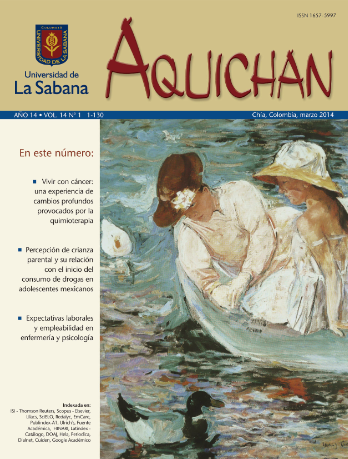The Effect of Socio-cultural Factors on the Self-care Capacity of Hospitalized Patients with Type 2 Diabetes
Keywords:
Diabetes Mellitus, Type 2, self-care, patient care, public health, nursingAbstract
Introduction: Type 2 diabetes is considered a public health problem because of its increasing prevalence and incidence. Objective: The purpose of this research is to describe the effect of socio-cultural factors on the self-care capacity of patients with type 2 diabetes who are hospitalized at the Tecomán General Hospital in Colima, Mexico. Method: This is a cross-sectional, observational study of 68 hospitalized patients with type 2 diabetes. An instrument to measure the effect of socio-cultural factors on the capacity for self-care was used. Data analysis was conducted with the odds ratio method, confidence intervals at 95 % and attributable fraction in exposures. Results: Socio-cultural factors had a slight positive effect on the capacity for self-care among hospitalized patients with type 2 diabetes (RM = 1.10, 95 % CI, 0.26 to 4.74). Conclusions: The socio-cultural factors outlined in the General Self-care Deficit Theory; namely, life experiences, work experiences, religion, customs and traditions, healing practices and rituals, were shown to have a positive effect on the self-care capacity of people with type 2 diabetes.
Downloads
Published
How to Cite
Issue
Section
License
1. Proposed Policy for Journals That Offer Open Access
Authors who publish with this journal agree to the following terms:
- The journal and its papers are published with the Creative Commons License Attribution-NonCommercial-NoDerivatives 4.0 International (CC BY-NC-ND 4.0). You are free to share copy and redistribute the material in any medium or format if you: give appropriate credit, provide a link to the license, and indicate if changes were made; don’t use our material for commercial purposes; don’t remix, transform, or build upon the material.





